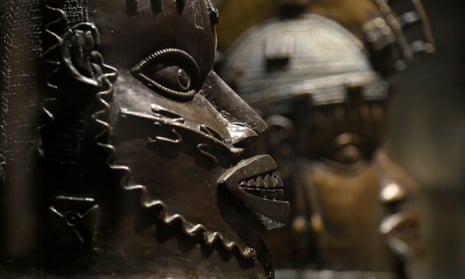This month marks 126 years since the British punitive expedition resulted in the theft of more than 10,000 objects from the Benin kingdom. They came to be known as the Benin bronzes, and have been at the centre of repatriation debates ever since.
Though the original victims are long gone, their descendants have eagerly awaited the return of the bronzes, and still do. As one such descendant, the issue of repatriation isn’t just diplomatic, it’s personal. My great-great-grandfather, HRH Ogbidi Okojie King of Uromi, fought alongside his relative Oba Ovonramwen Nogbaisi, the ruler of the Benin kingdom. What began as a family matter more than a century ago is now an international diplomatic issue.
Recently, Germany and the US – two countries not involved in the massacre and theft – as well as the Horniman museum and Jesus College, Cambridge all returned bronzes in their possession. Now other institutions, most notably the British Museum (home to more than 900 objects), have been forced to respond to calls to give back those in their possession.
The Benin kingdom was one of the last independent African kingdoms, and a thorn in Britain’s side, with its Oba (king) refusing to allow Britain’s Royal Niger Company to form a trading monopoly in the region. Britain ordered an expedition to dispose of him, but it was defeated by Nogbaisi and his allies. In response, Britain ordered another expedition, which began on 9 February 1897. Troops massacred an unknown number of people, destroyed the walls of Benin (at one point a longer structure than China’s Great Wall), and looted everything valuable.
The bronzes were royal, sacred and ceremonial objects used to archive history and depict the centuries-old Benin civilisation. Researchers suggest that about 10,000 objects were stolen and then dispersed across the world, ending up in Britain, Germany, the US, Austria, Russia, Sweden, Holland and Belgium, among others.
Britain documented the theft with volumes of paperwork showing how the loot went to museums, using arguments about its subsequent availability to a wider audience to legitimise the violence, death and destruction used to acquire it. This also implied that Africa’s cultural heritage is valuable, important and meaningful when objectified as “artwork” in European institutions. Edo history was stolen, and keeping it condones British imperial violence.
The other claim made by museums, that the bronzes would have fallen into disrepair because the owners did not have the facilities to care for them, is the same supremacist thinking. The argument that Africa has no museums is used to justify this opinion, when in reality museums as we know them today are a 19th-century Eurocentric construct. The bronzes were looted from their place of use – the royal palace itself – then kept by soldiers and sold to museums. This was no more “safekeeping” than stealing and selling a mobile phone would be today. The bronzes were then displayed to show the “success” of the empire in museums that venerated Britain’s imperialism. They were meant to show Britons, who received little to nothing of the wealth that the empire provided the ruling establishment, that the empire was worthwhile and justified.
The Benin bronzes counter still-prevalent ignorance of Africa’s pre-colonial history. They document centuries of trading relationships with the Portuguese before the British arrived. They teach the lineage of Benin’s Obas and queen mothers, and are visual manifestations of Benin’s spiritual, cultural and historical material heritage. The very existence of the bronzes represents a rebuttal of the ideas of white supremacy that underpinned empire, contradicting ideas of African barbarity and racial inferiority.
The continued retention of the bronzes, part of 90% of Africa’s material cultural heritage that resides outside the continent, is an ongoing injustice. The deliberate refusal to return what was stolen shows the descendants of the victims that the descendants of the thieves still consider them inferior in a way that hasn’t changed since 1897.
As someone with this heritage, but also a British citizen, I am placed in a difficult position. Living in the UK, I benefit from seeing my ancestors’ material heritage whenever I please. Yet I also experience a sense of unease, knowing this is not where they truly belong. I also live with the grief that the legacy and history my ancestors wanted to proudly record in the bronzes has been overshadowed by the colonial brutality used to steal them.
A visit to the British Museum is a reminder of the pain, violence, destruction and death inflicted on my forebears. The return of looted objects to their rightful places of origin is a necessary step for Britain to begin addressing and acknowledging its imperial past.
Noah Anthony Enahoro is a freelance journalist and writer based in London
Do you have an opinion on the issues raised in this article? If you would like to submit a response of up to 300 words by email to be considered for publication in our letters section, please click here.

